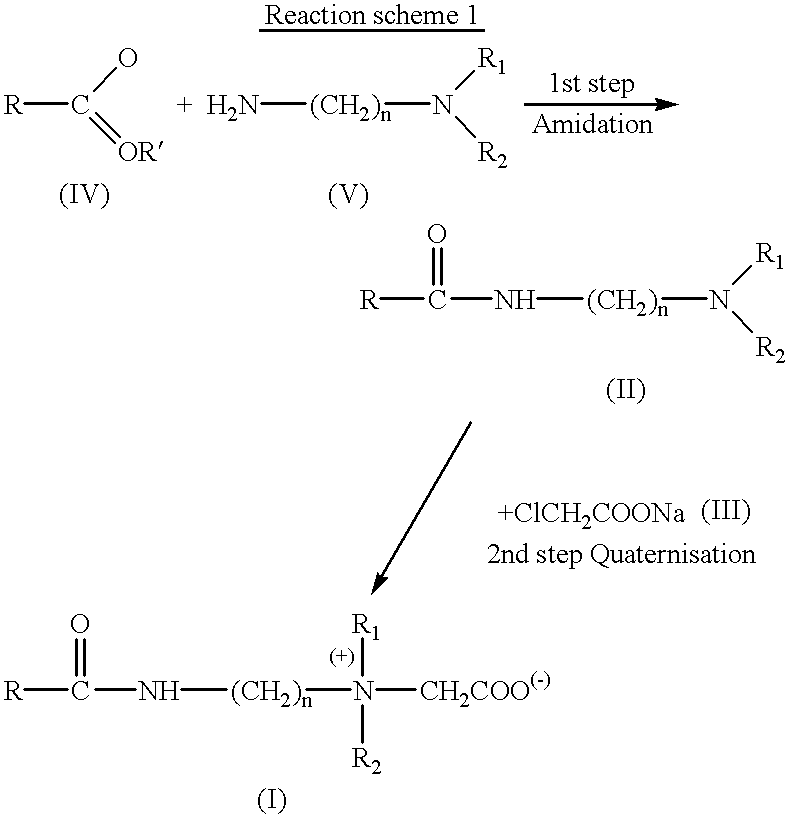Concentrated aqueous betaine-type surfactant compositions and process for their preparation
a concentration aqueous betaine and surfactant technology, applied in the field of amphoteric type surfactants, can solve the problems of manufacturing stability problems, inability to achieve compositions with good fluidity, and serious problems in maintaining the flowable liquid state, etc., to achieve excellent properties, low gel point, and low viscosity
- Summary
- Abstract
- Description
- Claims
- Application Information
AI Technical Summary
Benefits of technology
Problems solved by technology
Method used
Image
Examples
example
Example 1
Preparation of the amidoamine (II) from a fatty acid triglyceride
##STR7##
417 g of dimethylaminopropylamine and 837 g of hydrogenated coconut oil are mixed in a 2-liter reaction flask equipped with a stirrer, a temperature probe and an inert gas inlet. The mixture is heated up to 150.degree. C. and maintained under these conditions with reflux until the ester content (expressed as methyl laurate) is less than 2%. At this point, the excess amine is eliminated by vacuum distillation until the dimethylaminopropylamine is less than 200 ppm.
A product is obtained with a total amine value of 171.3 mg KOH / g, and an ester content of 0.5% (equivalent to a saponification index of 1.3 mg KOH / g).
example 2
Preparation of the amidoamine (II) from fatty acid
##STR8##
2003 g of hydrogenated coconut fatty acid is fed into a 5-liter reaction flask equipped with a stirrer, a temperature probe and an inert gas inlet. The acid is heated to 1500.degree. C. and 1075 g of dimethylaminopropylamine is added. The reaction conditions are maintained, distilling the water of amidation, until the acid value is less than 5 mg KOH / g. At this point, the excess amine is eliminated by vacuum distillation until the dimethylaminopropylamine is less than 200 ppm.
A product is obtained with a total amine value of 189.5 mg KOH / g, and an acid value of 4.5 mg KOH / g.
example 3
Preparation of a betaine composition with a fatty alcohol phosphoric ester as fluidizing additive
##STR9##
370 g of water, 10 g of 50% sodium hydroxide solution and 22.5 g of MAP-20 (phosphoric ester of lauryl alcohol with ratio of monosubstituted phosphate to disubstituted phosphate of 75:25, marketed by KAO Corporation), corresponding to 3% based on the total feed, are fed into a 1-liter reaction flask equipped with a stirrer, a temperature probe and a pH electrode. The mixture is heated to 60.degree. C. until the additive is completely incorporated. 100.6 g of sodium monochloroacetate and 158 g of the amidoamine prepared in Example 1 are then fed in and the mixture is heated to 80.degree. C. Once all the reagents are incorporated, a further 93.9 g of amidoamine is added in 1 hour. On completion of the addition, the pH is adjusted to a value of 8.5 with 50% sodium hydroxide and the pH and temperature conditions are maintained for 8 hours. After this time the residual amidoamine cont...
PUM
| Property | Measurement | Unit |
|---|---|---|
| Fraction | aaaaa | aaaaa |
| Fraction | aaaaa | aaaaa |
| Fraction | aaaaa | aaaaa |
Abstract
Description
Claims
Application Information
 Login to View More
Login to View More - R&D
- Intellectual Property
- Life Sciences
- Materials
- Tech Scout
- Unparalleled Data Quality
- Higher Quality Content
- 60% Fewer Hallucinations
Browse by: Latest US Patents, China's latest patents, Technical Efficacy Thesaurus, Application Domain, Technology Topic, Popular Technical Reports.
© 2025 PatSnap. All rights reserved.Legal|Privacy policy|Modern Slavery Act Transparency Statement|Sitemap|About US| Contact US: help@patsnap.com



